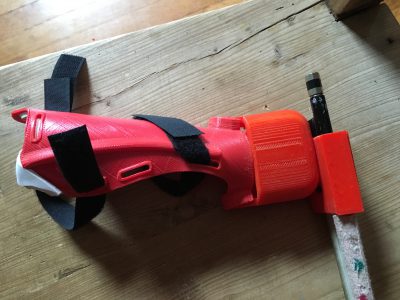Research | Students | Teaching | Bio | CV | Advice | Fun | Contact
Research
My work is focused on giving people with disabilities the voice, tools and agency to advocate for themselves. I take a multifaceted approach that includes machine learning, 3D printing, and tool building. At a high level, my goal is to tackle the technical challenges necessary for everyday individuals and communities to solve real-world problems (see all the Make4all projects).
Some of my writing about my disability experience and my Lyme blog
Some of my most recent projects (All):
Students
Current PhD students:
Former PhD Students:
Also those with no make4all page: Mark Baldwin (co-advised with Gillian Hayes); Christian Koehler; Sunyoung Kim; Scott Carter; Tara Matthews; Julia Schwarz
I love to work with undergraduate and masters students and have mentored more than I can count. My mentorship always tries to include career advice as well as project advice, whether students are going on to research or not. Many undergraduate students I advised have gone on to careers in research, however, including some current faculty (Julie Kientz, Gary Hsieh, Ruth Wylie). There are at least 50 other students who are alumni of my group who are not currently listed on this page but who all made important contributions to my work over the years. Some current mentees:
Your Portfolio Archive currently has no entries. You can start creating them on your dashboard.
Recent Alumni I mentored/advised:
Additional alumni can be found on the People page.
Teaching
I love to teach, and have put significant time into curriculum development over the years.
CLASSES DEVELOPED FOR AND TAUGHT AT CMU
- I am currently developing a new course on data centric computing, called The Data Pipeline. The course is accessible to novice programmers and includes a series of tutorials that can support independent online learning.
- I helped to redesign the HCI Masters course User Centered Research and Evaluation, specifically bringing a real world focus to our skills teaching around contextual inquiry
- I developed an online course specifically for folks who want to know enough program to be able to prototype simple interfaces (targeted at our incoming masters students). The course is available free online at CMU’s Open Learning Initiative under “Media Programming”
- I developed and taught the Environment and Society course over the last five years. This was a project oriented course that took a very multifaceted look at the role of technology in solving environmental problems.
- I helped to develop a reading course that is required for our PhD students to ensure that they have depth in technical HCI: CS Mini
- Assistive Technology: I developed and taught one of the first Assistive Technology courses in the country (specifically from an HCI perspective), and I used a service learning model to do so. Original class
- I have helped to revamp Process and Theory over the years, a skills course intended for our first year PhD students.
Bio
My Bachelor’s of Arts was done at Oberlin College, where I was a member of two great societies — FOO and ACM. I received my Ph.D. as a member of the Future Computing Environments research group in the College of Computing at Georgia Tech , Gregory Abowd and Scott Hudson were my advisors. I then spent three formative years at UC Berkeley as an Assistant Professor working with the I/O group and 12 years at CMU before joining the faculty of the University of Washington. This is my “Academic genealogy” on the Abowd side. I am also disabled, with an invisible chronic illness, and I am happy to talk about my experience of navigating both medical and social barriers in academia and provide mentorship. Please reach out if I can help.
Bio: Jennifer Mankoff is the Richard E. Ladner Professor in the Paul G. Allen School of Computer Science & Engineering at the University of Washington. Her research is focused on accessibility through giving people the voice, tools and agency to advocate for themselves. She strives to bring both structural and personal perspectives to her work. For example, her recent work in fabrication of accessible technologies considers not only innovative tools that can enable individual makers but also the larger clinical and sociological challenges to disseminating and sharing designs. Jennifer received her PhD at Georgia Tech, advised by Gregory Abowd and Scott Hudson, and her B.A. from Oberlin College.
Her previous faculty positions include UC Berkeley’s EECS department and Carnegie Mellon’s HCI Institute. Jennifer is a CHI Academy member and has been recognized with a SIGCHI Social Impact Award, an Alfred P. Sloan Fellowship and IBM Faculty Fellowship, and an ASSETS 10 year impact award.
Other Thoughts and Links
- Advice about searching through literature, doing reviews, etc.
- Please email me if you need information or help regarding RSI (or are experiencing any computer-related pain).
- I have chronic lyme disease. Lyme disease is the most common vector born disease in America today. I write about my experiences on A Lyme Disease Journal
- Best Conference Experience Ever: The CHI Straggles Seder
-
This slideshow requires JavaScript.
|
This slideshow requires JavaScript. |
|
Contact Information
Jennifer Mankoff
jmankoff [at] acm.org
206-685-3035
Paul G. Allen School of Computer Science & Engineering
University of Washington
Paul G. Allen Center
185 Stevens Way
Campus Box 352350
Seattle, WA 98195






































